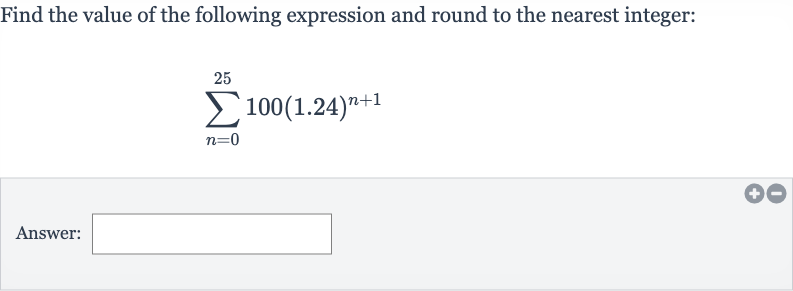Full solution
Q. Find the value of the following expression and round to the nearest integer:Answer:
- Given Geometric Series: We are given a geometric series with the first term and the common ratio . The sum of the first terms of a geometric series is given by the formula when is not equal to . Here, we need to find the sum of the series from to , which means we will be summing terms.
- Calculate First Term: First, calculate the first term of the series .
- Apply Sum Formula: The first term is .
- Substitute Values: Now, apply the formula for the sum of the first terms of a geometric series: . Here, , , and .
- Calculate Exponent: Substitute the values into the formula to get .
- Substitute Exponent: Calculate using a calculator to avoid any potential math errors.
- Simplify Expression: The value of is approximately . This is a large number, so it's important to use a calculator to ensure accuracy.
- Calculate Sum: Now, substitute back into the formula to get .
- Round to Nearest Integer: Simplify the expression to find the sum .
- Round to Nearest Integer: Simplify the expression to find the sum .Calculate the sum (rounded to two decimal places for intermediate steps).
- Round to Nearest Integer: Simplify the expression to find the sum .Calculate the sum (rounded to two decimal places for intermediate steps).The sum is approximately .
- Round to Nearest Integer: Simplify the expression to find the sum .Calculate the sum (rounded to two decimal places for intermediate steps).The sum is approximately .Round to the nearest integer to get the final answer.
- Round to Nearest Integer: Simplify the expression to find the sum .Calculate the sum (rounded to two decimal places for intermediate steps).The sum is approximately .Round to the nearest integer to get the final answer.The rounded value is .

